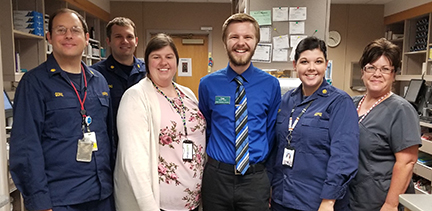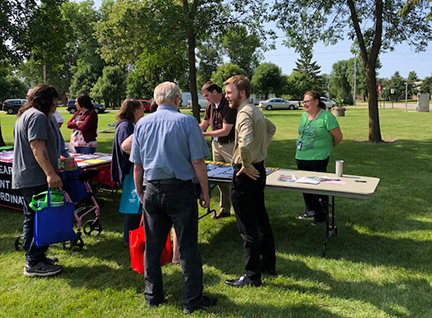
Tyler Maanum is a third year NDSU pharmacy student. The Alexandria, Minnesota native found another career path in the pharmacy profession when he attended a College of Health Professions Career Fair. There was a booth for the United States Public Health Service with two people dressed in military uniforms. Tyler didn’t know where that visit would lead. Here’s how his story unfolded, in his own words.
At the Career Fair, Public Health Service pharmacists shared with me what they did on a daily basis as clinical pharmacists and the increased role of the pharmacist in patient care caught my attention immediately. I was given information on a program called the Junior Commissioned Officer Student Training and Extern Program (JRCOSTEP).
I decided this would be an excellent opportunity to learn something new and get out of my comfort zone of retail pharmacy. I took the first step of the application process. I was well aware this was a highly competitive national internship/externship with the previous year having 382 applicants and only 25 pharmacy students selected.
In January 2018, I got the call saying that I was accepted for this program and would serve on the White Earth Reservation with Indian Health Service at the White Earth Health Center pharmacy in the summer of 2018.
Throughout the two months that I was at the WEHC pharmacy, I was exposed to the roles of the pharmacy technicians, pharmacists, home health nurses, and harm reduction. My duties involved filling prescriptions and customer service and I spent a good chunk of my time learning the roles of the clinical pharmacist and the different services the clinic offered such as tobacco cessation clinic, anticoagulation clinic, hepatitis C clinic, naloxone training, etc.
Eye-opening experiences I participated in involved accompanying a home health nurse on patient home visits to prepare medications in daily containers for the next two weeks, performing routine physical assessments, and examining the feet of patients with diabetes to assess their perception of touch, get their body weight, blood pressure and blood glucose, and answering any questions.
Many of these patients live in remote areas and cannot easily access the clinic or hospital if needed. I’ve read about all of this before in textbooks, but you don’t know what it’s truly like until you are actually in that situation. Too often we forget to think how the environment the patient is living in is influencing their health and how or if they take their medication.
I also participated in the harm reduction program that is offered across the reservation, observing the challenge of opioids and its impacts. With increasing opioid use nationwide, hepatitis C also increases from needle sharing. We set up a clinic that provided patients with needed supplies. This was an experience completely different from what I had previously known.
One of my favorite experiences involved diabetes education during the annual Elder’s Picnic. I put together a Diabetes Jeopardy board where the patient would pick a category and have a true or false question to answer. Their prize was a couple pieces of sugar free candy.

At the Elder’s Picnic where the elders of the Ojibwe tribe gather, there were at least 50 people who stopped by and every single one of them recognized the Diabetes Jeopardy board. It was such an enjoyable change of pace to interact with a wide variety of patients in a population where diabetes is prevalent to talk about their medications, diet, and exercise.
The main thing that I learned about myself during this experience was to do what my gut was telling me to do. When I went to the Career Fair back in 2017, there was something inside of me telling me to apply and to just take a chance. My experience was incredible. Besides helping patients, I drove around the entire White Earth reservation and it was one of the most beautiful places I have been in my entire life.
I strongly recommend that students who are interested in this route for pharmacy, or are even just curious, to apply for this internship. The knowledge that I gained over the two months with Indian Health Service is incredible. There is no textbook that can replace that experience.
It is important to remember that the classroom material is the foundation for your understanding of the practice of pharmacy, but being out there and actually practicing pharmacy and interacting with people is what pharmacy is all about.
Maanum hopes to join the U.S. Public Health Service after graduation and work with IHS with the goal of one day achieving the rank of Rear Admiral (Assistant Surgeon General).


